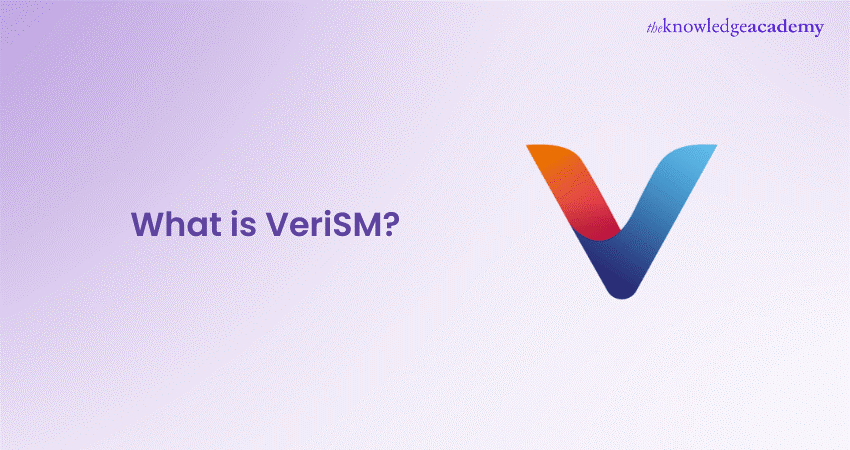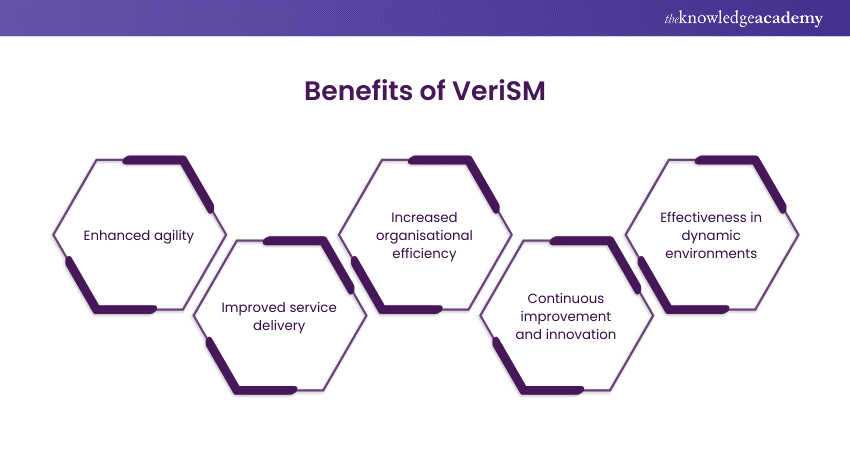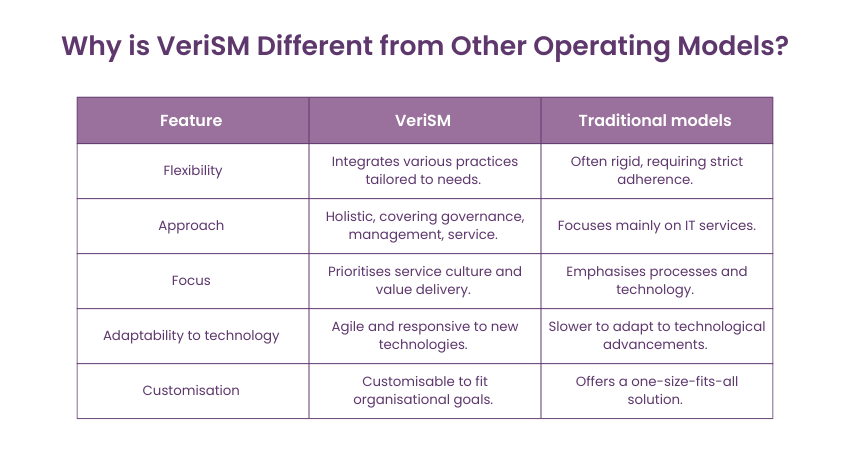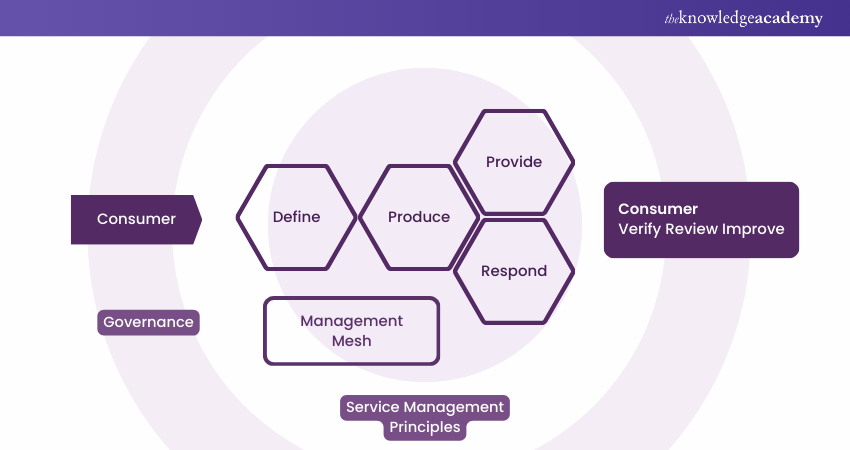We may not have the course you’re looking for. If you enquire or give us a call on +44 1344 203 999 and speak to our training experts, we may still be able to help with your training requirements.
Training Outcomes Within Your Budget!
We ensure quality, budget-alignment, and timely delivery by our expert instructors.

Imagine your organisation as a sleek, high-speed train hurtling toward the digital future. But wait, there’s a twist: this train isn’t just about technology; it’s about aligning every wheel, cog, and byte with your strategic goals. Enter VeriSM – that bridges the gap between Service Management and organisational success. But What is VeriSm Exactly?
Unlike traditional models, VeriSM isn’t a one-size-fits-all suit; it’s a tailor-made ensemble that adapts to your unique needs. This blog will discuss the key concepts of What is VeriSM, its benefits, and how it stands out from traditional Service Management models. Join us as we uncover how to effectively incorporate the VeriSM model into your operations, ensuring flexibility and responsiveness.
Table of Contents
1) Decoding What is VeriSM?
2) What is the VeriSM approach?
3) Key concepts in VeriSM
4) Benefits of VeriSM
5) Why is VeriSM different from other operating models?
6) What is VeriSM model?
7) Target audience of VeriSM
8) VeriSM Scope
9) Conclusion
Decoding What is VeriSM?
VeriSM stands for "Value-driven, Evolving, Responsive, Integrated Service Management. It is a Service Management approach that helps organisations create a flexible operating model tailored to their needs. Unlike traditional Service Management frameworks that focus on rigid processes and IT-specific areas, VeriSM integrates Service Management principles with governance, service, and organisational management. This approach aligns all elements with service culture and emerging technologies.
What is the VeriSM Approach?
The VeriSM approach is characterised by its adaptability and emphasis on services that are driven by organisationals goals and customer expectations. It allows organisations to respond swiftly to changes in the environment by providing a scalable framework that integrates various management practices and new technologies seamlessly. This approach enables companies to achieve their Service Management objectives without being bound by any single methodology.
Learn how VeriSM™ re-defines IT Service Management with our VeriSM™ Essentials Course – join today!
Key Concepts in VeriSM
The key concepts in VeriSM focus on the customer and the organisation's capabilities, which are essential for delivering high-quality Service Management. Here are the concepts you need to know:
1) The customer
The VeriSM model places the customer at the core of all operations. This method prioritises a deep understanding of customer needs and expectations. It ensures that every aspect of Service Management is designed to provide real value to the customers. VeriSM encourages organisations to engage with their customers, gather feedback continuously, and adapt services to meet evolving needs, ensuring customer satisfaction and loyalty.
2) Capabilities
In VeriSM, capabilities refer to the combination of resources that an organisation leverages to achieve its Service Management goals. These include:
a) Technology: Utilising the latest tools and technologies to enhance service delivery and ensure efficiency and security.
b) People: Investing in the development of the workforce through training and support. This enhances the ability to contribute effectively to service management.
c) Processes: Processes in VeriSM involve designing and implementing streamlined and flexible workflows. This allows the organisation to adjust quickly to adapt to the business environment or shifts in customer requirements.
Benefits of VeriSM
VeriSM provides numerous benefits that can enhance the way organisations manage their services. Here are some of the key benefits:

a) Enhanced Agility: VeriSM allows organisations to quickly adapt to changes in technology and market conditions. It ensures responsiveness to client demands and industry shifts.
b) Improved Service Delivery: By aligning Service Management practices with customer needs and employing efficient processes, VeriSM improves the quality and reliability of service delivery.
c) Increased Organisational Efficiency: VeriSM promotes a holistic approach that optimises the use of resources, reduces waste, and streamlines operations across the board.
d) Continuous Improvement and Innovation: The method encourages ongoing enhancement of services and processes, fostering innovation and keeping the organisation ahead in a competitive landscape.
e) Effectiveness in Dynamic Environments: VeriSM's flexibility makes it particularly effective in dynamic and fast-changing business environments, helping organisations to thrive amid uncertainty.
Learn the IT Service Management approach to deliver IT digital services with our VeriSM™ Foundation Course – join today!
Why is VeriSM Different from Other Operating Models?
VeriSM differs from other operating models in several ways, making it a distinctive choice for organisations seeking a modern approach to service management. Here is a comparison highlighting the differences:

a) Flexibility: While traditional models often prescribe strict adherence to specific methodologies, VeriSM allows for the integration of various management practices, tailoring them to the unique needs of the organisation.
b) Holistic Approach: Other models might focus predominantly on IT services, but VeriSM offers a framework that includes governance, management, and service improvement across all areas of the organisation, not just IT.
c) Focus on Service Culture: Unlike models that prioritise processes and technology, VeriSM emphasises a service culture that aligns all business functions with the goals of customer satisfaction and value delivery.
d) Adaptability to Technological Advances: Many traditional models are slower to adapt to new technologies. In contrast, VeriSM is designed to be agile and responsive, enabling organisations to quickly incorporate digital innovations into their Service Management strategies.
e) Customisable for Organisational Needs: Whereas other models may offer a one-size-fits-all solution, VeriSM promotes customisation of Service Management practices to align with organisational goals and customer demands.
Master digital service management with VeriSM Training. Join now and stay ahead in the evolving IT landscape!
What is VeriSM Model?
The VeriSM Model begins with governance and core service-management principles, centered around the management mesh, which focuses on delivering and supporting services designed with the consumer in mind and validated upon delivery.
The following diagram illustrates the model, highlighting four key principles that overlay the management mesh. These principles leverage the defined operating model using the management mesh to execute and achieve desired results. Think of these as stages within the model:
1) Define: Design the service to meet consumer requirements.
2) Produce: Create the solution/service, including build, test, and deployment.
3) Provide: Enable consumers to access and use the service.
4) Respond: Support and improve the service throughout its lifecycle.

The model supports these activities based on:
1) Governance: An organisation’s culture, values, and policies that direct and control activities.
2) Service-Management Principles: Practices defined by governance that dictate how activities are executed, acting as "guardrails."
3) Management Mesh: Defines how an organisation combines resources, capabilities, environment, and technology (including emerging technology) to create and provide services.
This unique combination of factors creates the operating model an organisation will use to deliver services for a specific initiative. The value lies in the flexibility of integration for each initiative.
Governance and principles are relatively static and driven by leadership, while the structure of the management mesh, such as resources and technology, varies from project to project. This enables an organisation to create various operating models tailored to the specific needs of each project.
Target audience of VeriSM
Unlike many industry-specific frameworks and standards, VeriSM transcends organisational boundaries, offering a common language that eliminates silos. It facilitates collaboration across various departments, whether they are in IT, HR, Legal, Accounting, or Office Services. VeriSM does not replace industry-specific certifications or educational programs; instead, it leverages diverse practices to achieve desired results.
VeriSM Scope
VeriSM's scope is fluid and adaptable, making it applicable to any organisation at any time to achieve specific outcomes. The scope is defined by the initiative or project itself. VeriSM recommends setting the initiative's scope as part of the initial planning process. This approach allows organisations to apply VeriSM across different providers and use its concepts for internal projects.
Within VeriSM, scope is also a component of the governance structure, establishing limits and boundaries for a given project. By clearly defining the scope, the project team understands what is included and excluded, ensuring clarity and focus.
Conclusion
Understanding “What is VeriSM?” and how to use it can really change how your organisation manages services. VeriSM helps businesses adapt quickly and stay focused on what customers need. It mixes traditional management with new technology and customer priorities. If you want a model that encourages ongoing improvement and new ideas, VeriSM is a great choice.
Identify how to move from a reactive to a proactive operation with our VeriSM™ Plus Course – join today!
Frequently Asked Questions

VeriSM supports digital transformation by providing a flexible Service Management approach that integrates various management practices to align with the changing needs of digital services. It focuses on adaptability and responsiveness, which are essential for businesses undergoing digital transformation.

VeriSM can indeed be applied in non-IT contexts as it is designed to be agnostic of industry type. Its principles and adaptable management allow for application in any Service Management area, not just IT.

The Knowledge Academy takes global learning to new heights, offering over 30,000 online courses across 490+ locations in 220 countries. This expansive reach ensures accessibility and convenience for learners worldwide.
Alongside our diverse Online Course Catalogue, encompassing 17 major categories, we go the extra mile by providing a plethora of free educational Online Resources like News updates, Blogs, videos, webinars, and interview questions. Tailoring learning experiences further, professionals can maximise value with customisable Course Bundles of TKA.

The Knowledge Academy’s Knowledge Pass, a prepaid voucher, adds another layer of flexibility, allowing course bookings over a 12-month period. Join us on a journey where education knows no bounds.

The Knowledge Academy offers various VeriSM™ Courses, including the VeriSM™ Foundation Course, VeriSM™ Essentials Course, and VeriSM™ Plus Course. These courses cater to different skill levels, providing comprehensive insights into ISO 20000 IT Service Management.
Our IT Service Management Blogs cover a range of topics related to IT Service Management, offering valuable resources, best practices, and industry insights. Whether you are a beginner or looking to advance your IT skills, The Knowledge Academy's diverse courses and informative blogs have got you covered.
Upcoming IT Service Management Resources Batches & Dates
Date
 VeriSM™ Foundation
VeriSM™ Foundation
Thu 13th Feb 2025
Thu 15th May 2025
Thu 21st Aug 2025
Thu 6th Nov 2025







 Top Rated Course
Top Rated Course



 If you wish to make any changes to your course, please
If you wish to make any changes to your course, please


